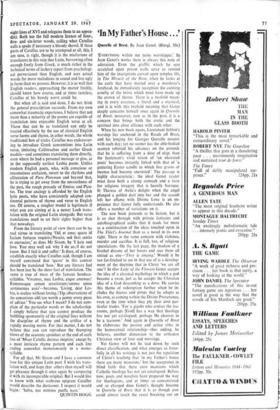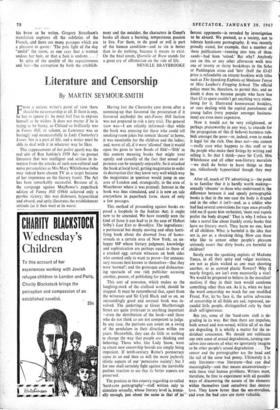`In My Father's House . • •
Querelle of Brest. By Jean Genet. (Blonji, 30s.)
`EvEurruiNo within me turns worshipper.' In Jean Genet's works there is always this note of adoration. Even the graffiti which he sees scratched upon prison walls serve to remind him of the inscriptions carved upon temples. Or, in The Miracle of the Rose, when he looks at the curls that have matted over a murderer's forehead, he immediately recognises the cunning cruelty of the twists which must have made up the crown of thorns. There is a twofold mean- ing in every creature, a literal and a mystical, and it is with this twofold meaning that Genet deeply concerns himself once again in Querelle of Brest; moreover, now as in the past, it is a concern that brings both the erotic and the spiritual into close alliance with each other.
When his new book opens, Lieutenant Seblon's warship lies anchored in the Roads off Brest, and his longing for Georges Querelle mounts with each day; yet no sooner has the able-bodied seaman rebutted his advances on the grounds that he is suffering from a dose of clap, than the lieutenant's vivid vision of 'an ulcerated penis' becomes instantly linked with that of 'a guttering Easter candle to which five grains of incense had become encrusted.' The passage is highly characteristic: the ideal Genet reader must have both a strong stomach and a taste for religious imagery that is heavily baroque. St Theresa of Avila's delight when the angel plunged a golden dart into her and the assault left her aflame with Divine Love is an ex- perience that Genet fully understands. He also offers a number of variations on it.
The new book pretends to be fiction; but it is so shot through with private fantasies and autobiographical asides that it reads far more as a continuation of the ideas touched upon in The Thief's Journal than as a novel in its own right. There is the same concern with violence, murder and sacrifice. It is full, too, of religious speculations. On the last page, the madam of a brothel dreams of her lovers and sees them all united as one—`They is singing.' Would it be too far-fetched to see in that use of is a develop- ment of the doctrine that in Christ 'we are all one'? In Our Lady of the Flowers Genet accepts the idea of a classical mythology in which a god became a swan, just as he accepts the Christian idea of a God descending as a dove. He carries this theme of redemption further when he in- cludes the thieves and pimps that he adopts as his own, as coming within the Divine Provenance, even at the time when they ply their own par- ticular trades. 'For a gigolo who cruises the tea- rooms, perhaps [God] has a way that theology has not yet catalogued, perhaps He chooses to be a tearoom.' And again in Querelle of Brest he elaborates the passive and active roles in the homosexual relationship—thus adding, he believes, another dimension to the orthodox Christian view of love and marriage.
Yet Genet will not be tied down by such direct classification, and what emerges so force- fully in all his writings is not just the repetition of Christ's teaching that 'in my Father's house there are many mansions,' but the acceptance in blind faith that there exist mansions which Catholic theology has not yet catalogued. Before now, poets and novelists have prepared the way for theologians, and at times so concentrated and so charged does Genet's thought become in Querelle of Brest that it is as though you could almost touch the sweat breaking out on his brow as he writes. Gregory Streatham's translation captures all the subtleties of the French, and there are many passages which are a pleasure to quote: 'The pale light of the day "undid" the room, as one says that a woman undoes her hair, or that a face is undone. . .
In spite of the quality of the rapaciousness and lust—the corruption by both the establish- ment and the outsider, the characters in Genet's books all share a burning, tempestuous passion to live. For them, to do good or evil is part of the human condition—and to sin is better than to do nothing, because it means to exist. On the final count, Querelle of Brest stands for a great cry of affirmation on the side of life.
NEVILLE BRAYBROOKE



































 Previous page
Previous page